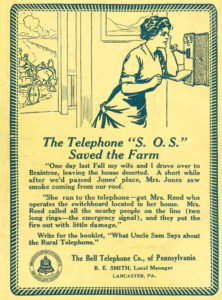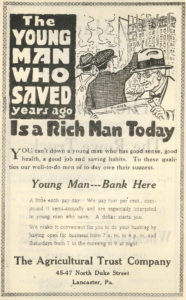“It ought to be a Great Fair!”
The Farmers’ Fair Collection, MG-146
written by Elizabeth McIlhenney, Archives Volunteer
LancasterHistory.org is home to the extensive Farmers’ Fair Collection. The collection contains premium lists, fliers, stock certificates, entry blanks, and much more memorabilia from Farmers’ Fairs in Lancaster County spanning many years.
A premium list is a guide to the fair containing entry categories and prizes offered for winners, general rules and many advertisements. The earliest premium list is from 1888. In many of the earlier premium lists, there is a written introduction discussing the fair and its importance.
In the 1888 premium list, in an introductory “To the public” section, the unknown author writes, “with the richest agricultural district in the world (the tobacco crop alone having reached $3,000,000 in one year) it ought to be a great fair.” $3,000,000 in 1888 is equivalent to $75,000,000 in 2015, which is quite a hefty sum of money. The fair featured many different exhibitions in 1888, from departments listing premiums for horses, cattle, sheep, and swine to embroidery, painting and decorative art, carriages, agricultural implements, ladies’ handiwork, and food items such as fruits, vegetables, and grains. There were also “Grand Special Premiums” listed. For example, in the 1889 premium list, The New Era publishers offered a contest for the “best loaf of bread made and baked by a farmer’s daughter under fifteen years of age,” the “best specimen of improved breed of fowls, raised by a farmer’s son or daughter under 15 years of age,” and other offerings. Many other “Grand Special Premiums” were offered by other companies, such as B. J. McGrann’s contest for “$50 in money to a lady of 21 years or under, city or county, writing the best essay on “Corn and its Uses.”
Possibly the most fascinating features in the Farmers’ Fair collection are the advertisements, some preserved as clippings and numerous others in the premium lists. These advertisements allow the reader to take a peek in the world of the ordinary Lancaster farmer living in that time, whether it be 1888 or 1959. One of the best ways to learn about how people lived back then is to look at what kinds of merchandise and household goods they were buying. Many of the ads, especially in the earlier premium lists, focus on “reliable,” “reasonable,” and “practical” prices. Many of the shops would call themselves the “headquarters” for whatever they sold, whether it be for hats or carriages. It seems that Lancastrians were always on the look-out for a good bargain. Some things never change.
 Another fascinating thing about the advertisements in the premium lists are the slogans that these businesses used, as well as campaigns that included stories written about how the company’s product or services made the lives of a fictional person or family better. In the 1913 premium list for the Great Lancaster Fair, the Bell Telephone Company of Pennsylvania had an ad with a picture of a woman speaking into a wall telephone, with a carriage racing towards a billowing cloud of smoke in the background. The byline below the picture reads, “The Telephone ‘S.O.S’ Saved the Farm” with a story following it. An advertisement for the Agricultural Trust Company teaches about smart saving habits in their one-page advert in the 1920 premium list. Next to an illustration of an elderly man reading a financial newspaper, it reads, “The young man who saved years ago is a rich man today.” This is a common theme in other advertisements from the era: the importance of the practical and smart spending and saving of money.
Another fascinating thing about the advertisements in the premium lists are the slogans that these businesses used, as well as campaigns that included stories written about how the company’s product or services made the lives of a fictional person or family better. In the 1913 premium list for the Great Lancaster Fair, the Bell Telephone Company of Pennsylvania had an ad with a picture of a woman speaking into a wall telephone, with a carriage racing towards a billowing cloud of smoke in the background. The byline below the picture reads, “The Telephone ‘S.O.S’ Saved the Farm” with a story following it. An advertisement for the Agricultural Trust Company teaches about smart saving habits in their one-page advert in the 1920 premium list. Next to an illustration of an elderly man reading a financial newspaper, it reads, “The young man who saved years ago is a rich man today.” This is a common theme in other advertisements from the era: the importance of the practical and smart spending and saving of money.

In 1909’s premium list for the first “Great Lancaster Fair,” which was held on October 12, 13, 14 and 15th, also has an introductory section, written by an unknown author, quotes President McKinley (who was president from 1897 to 1901), writing:
“President McKinley, at the Buffalo Exposition, the day before he was shot, in his address, said: ‘Fairs and expositions are the time keepers which mark the progress of nations; they record the world’s advancement; they stimulate the energy, enterprise and intellect of people and quicken human genius. They go into the home, they broaden and brighten the daily life of the people, they open mighty storehouses of information to the student. Every fair, great or small, has helped to some onward step. Comparison of ideas is always educational, and as such, instructs the brain and hand of man.’”
This theme of intellect and knowledge established by McKinley was adopted and upheld by the Lancaster County Agricultural Fair Association for many years after the 1909 premium list. Possibly inspired by this quote, knowledge and scientific advancement is a recurring theme in the literature in the Farmers’ Fair collection. In the premium list for the 1911 Fair, the “Forward” written by I.C. Arnold, who was then the secretary of the Lancaster Fair Association, reads, “It is our endeavor to make the Fair an educational institution, in the broadest sense. Education is much more practical when learned by seeing and doing, than merely by reading.” It is this emphasis on education, intellect, and progression, that was established by these early fairs, and the tradition has been withheld and carried through to today’s fairs. To explore the rich history of these events and experience this hands-on education yourself, visit the local fair in your community.
MG-146 Farmers’ Fair Collection
From Archives Blog